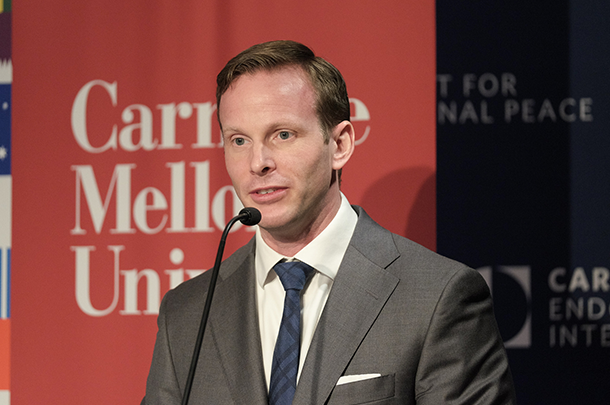International leaders convene at inaugural Carnegie Colloquium to discuss cyber issues
Daniel Tkacik
Nov 2, 2016
After Carnegie Mellon president Subra Suresh exchanged a handshake with Carnegie Endowment for International Peace president Bill Burns in a crowded, brightly-lit conference room, both knew it was time to get down to business. The most pressing international cyber issues were up for discussion.
Earlier this week, Carnegie Mellon and the Carnegie Endowment for International Peace co-hosted the inaugural Carnegie Colloquium, a gathering of international policy experts to discuss digital governance and security. The event was held at the Carnegie Endowment for International Peace headquarters in Washington, D.C.
“CMU’s advancements in artificial intelligence and cybersecurity have significantly benefited from the partnership between the university and the Carnegie Endowment for International Peace,” said Carnegie Mellon President Subra Suresh as he shared opening remarks to a standing room only room of more than 120 attendees. “We hope these discussions will better inform ongoing thinking in technology and diplomacy in these critical areas.”

Source: Carnegie Mellon University
CyLab director David Brumley set the stage for a second panel discussion focusing on autonomy and counter-autonomy in military operations.
In a panel discussion on the future of consumer privacy, Dean of the School of Computer Science Andrew Moore set the stage on challenges posed by artificial intelligence to consumers, who generally seek a more personalized experience.
“Privacy and personalization, which seem like clear goods, lead us to very difficult societal and technical challenges,” Moore said.
The panel discussion that followed featured insight from Ed Felton, Deputy CTO of the White House and computer science professor at Princeton, Yuet Tham, a partner at Sidley Austin in Hong Kong, and Paul Timmers, the director of the Sustainable and Secure Society Directorate in the European Commission Communications Networks.
Falling on the heels of a monumental win at last August’s DARPA Cyber Grand Challenge, an autonomous hacking competition in which systems competed for a $2 million prize, CyLab director David Brumley set the stage for a second panel discussion focusing on autonomy and counter-autonomy in military operations.
“Countries around the world, including the U.S., Russia, Israel, China and India, are increasingly deploying and investing in artificial intelligence and autonomy technology in their operations,” Brumley said. “Autonomy is going to be huge, and it’s absolutely critical we get it right.”
Autonomy is going to be huge, and it’s absolutely critical we get it right.
David Brumley, Director, CyLab, Carnegie Mellon University
Panelists for the discussion on autonomy included former colonel commandant of the Indian Army Corps of Signals Lt. Gen. Dr. R.S. Panwar, former head of Israel Defense Force’s International Law Department Daniel Reisner and Mary Wareham, advocacy director of the Arms Division at Human Rights Watch and global coordinator of the Campaign to Stop Killer Robots.
“The wide span of impact from artificial intelligence and cybersecurity demands these kinds of international discussions,” said Jim Garrett, Dean of Carnegie Mellon’s College of Engineering. “These forums provide an exchange of ideas, an appreciation for a wide variety of views and a debate on tough topics.”
The vibrant conversation will continue at the second session of the Carnegie Colloquium on Dec. 2 in Carnegie Mellon’s University Center, with discussions focusing on internet governance and cyber deterrence.
